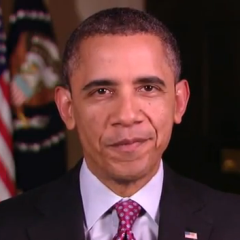Kenya: Obama has a word with Raila and Uhuru, but US position on ICC is ambiguous – By Njambi Ngunjiri

The upcoming national elections in Kenya bring a sense of trepidation and foreboding due to the post-election violence witnessed following the polls in 2007. Presumably, this is why The White House recently released a message from US President Obama to the Kenyan people. This is the first time he has addressed Kenyans directly since his historic victory in the 2008 US Presidential election and subsequent re-election in 2012. The video is loaded with meaning.
The President of the United States is a person whose focus lies primarily on the American people and the furthering US interests, therefore making a direct appeal to the population of another country is, to say the least, unusual. Obama’s relationship with his father’s birthplace is further complicated for the President by the fact that his roots have been used by his political opponents as a means of exaggerating his “˜otherness’ and questioning his authenticity as evidenced by the “˜birthers’ movement. His message to Kenya can therefore be considered a bold move as it acknowledges the duality of his heritage whilst occupying an office the demands of which prefer that he refrain from such a position.
More so, it is an attempt to relate with Kenyans as “˜one of us’, first by speaking in Kiswahili, and then directly saying, “I’ve been grateful for my connection to Kenya, and the way you’ve welcomed me and my family to your beautiful country…” This display of goodwill is bound to have special resonance with Kenyans around the world.
President Obama goes on to say, “The choice of who will lead Kenya is up to the Kenyan people. The United States does not endorse any candidate for office…” But some in the Luo community have wanted to claim a special kinship with Obama – in politics, perception is reality and allusions to influence can suggest power. Therefore, this announcement is problematic for Raila Odinga’s campaign. He is the Kenyan PM, a Luo and a son of Kenya’s first Vice President. It is worth noting that Obama was perceived as having snubbed Raila on several occasions in 2009 after assuming the US presidency.
It came as no surprise when Uhuru Kenyatta, a Kikuyu and the son of Kenya’s first president, was prompt in hosting a press conference to declare his support of Obama’s statement. He is Raila’s biggest competitor and the one with the most to gain from any fall out, be it real or imagined. This is perhaps the reason why Raila seemed reticent and only issued a statement via an aide.
Things become a little more interesting for Uhuru following two further remarks contained within the statement: “Kenyans must resolve disputes in the courts, not in the streets” followed by “…we do support an election that is peaceful and reflects the will of the people.” Uhuru has been formally indicted as a suspect in a case at the International Criminal Court (ICC) for crimes against humanity perpetrated during the post-election violence of 2007/8. The idea that Kenyans must resolve their cases in court is so ambiguous it could be amorphous.
Sometimes what is left unsaid speaks the loudest. The US is yet to ratify the Rome Statute and therefore does not participate in the ICC. The unequivocal support for a result that reflects the will of the people suggests that the US will be willing to work with the winner as long as the election is peaceful – and this includes Uhuru. This does not bode well for the case and somewhat serves to undermine the ICC’s resolve.
Kenya was formed as a result of colonial conquest; a territorial allegiance imposed on formerly stateless societies. The notion of a united Kenya is yet to take root and this is manifested by tribalism, ethnic tensions and violent clashes. The new constitution that President Obama refers to is a negotiated articulation of the aspirations of Kenyans for the society they seek; a step in the right direction. At the heart of his message, President Obama says that he “can’t imagine a better way to mark the 50th anniversary of Kenyan independence” than by having a peaceful election.
As the great Max Weber said, “One cannot prescribe to anyone whether he should follow an ethic of absolute ends or an ethic of responsibility…” and that “Politics is a strong and slow boring of hard board.” Raila and Uhuru are the front-runners in the contest for the highest political office in the land and they can opt to pursue the presidency as the end goal and by any means necessary. They could also choose to pursue a higher calling; to drill down and determinedly work towards a truly cohesive society so that we will never again stare into the precipice as we did in 2008. This requires that they leverage on their political influence and historical pedigree whilst extending their ambitions beyond their tribal chiefdoms. Lofty ideals from a man in Washington with Kenyan roots who believes, “Yes we can”.
Njambi Ngunjiri is a Kenyan living in America.







“But some in the Luo community have wanted to claim a special kinship with Obama – in politics, perception is reality and allusions to influence can suggest power.”
Hey, this is not true Ngunjiri. It is sad that you let your “Kenyanness” cloud your article. I have never seen any Luo politician campaign by associating themselves to Obama. Never. Even Raila has kept his distance since 2006. Can you tell me any Luo politician who has publicly used Obama’s name to campaign for political office? It as never happened. Please let us be fair to each other.
Kenyan: During an interview with the BBC in Jan 2008, Raila Odinga is recorded making comments explaining how he is related to President Obama. He then goes on to elaborate on the multiple convesations they have had
http://www.youtube.com/watch?v=CBJouPhws1M
http://news.bbc.co.uk/2/hi/africa/7176683.stm http://www.telegraph.co.uk/news/worldnews/1574963/Im-Barack-Obamas-cousin-says-Raila-Odinga.html